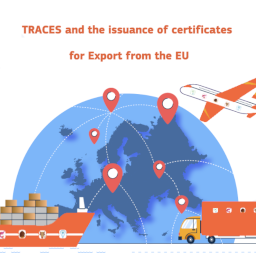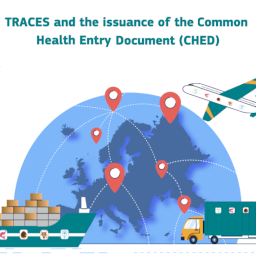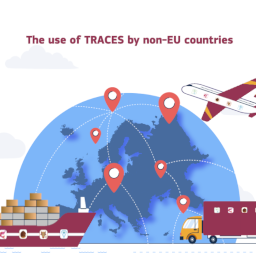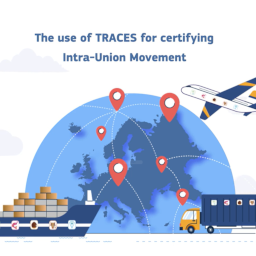
Questo corso eLearning è progettato per migliorare le conoscenze e le competenze degli operatori economici e dei funzionari delle autorità competenti che utilizzano TRACES.
Entro la fine di questo corso sarai in grado di:
- 1. Definire che cos'è TRACES e il quadro giuridico che disciplina TRACES e l'IMSOC
- 2. Comprendere il quadro giuridico che disciplina i seguenti moduli TRACES: ESPORTAZIONE UE e PHYTO per l'esportazione.
- 3.Navigare sul sistema TRACES e acquisire competenze pratiche per il rilascio dell'EXPORT UE e PHYTO per i certificati di esportazione
Caratteristiche
365 giorni di accesso
- Durata media: 4 ore
Online
- 3 unità
- Auto-percorso
- Multimedia
Disponibile in:
- inglese
- Altre lingue
Come registrarsi
- Se sei un funzionario governativo, puoi candidarti utilizzando l'applicazione BTSF eLearning.
- Se sei un membro del personale che lavora nelle istituzioni dell'UE, contatta HADEA-BTSF-ACADEMY-SUPPORT@ec.europa.eu per richiedere la registrazione.
- Per qualsiasi altra richiesta si prega di inviare un messaggio all'indirizzo HADEA-BTSF-ACADEMY-SUPPORT@ec.europa.eu e il team BTSF ACADEMY sarà lieto di assistervi.

Questo corso eLearning è progettato per migliorare le conoscenze e le competenze degli operatori economici e dei funzionari delle autorità competenti che utilizzano TRACES.
Entro la fine di questo corso sarai in grado di:
- 1. Definire che cos'è TRACES e il quadro giuridico che disciplina TRACES e l'IMSOC
- 2. Comprendere il quadro giuridico che disciplina i seguenti moduli TRACES: DSCE: A-P-D-PP e NoA (Notifica di arrivo)
- 3.Navigare sul sistema TRACES e acquisire competenze pratiche per il rilascio dei certificati CHED/NoA.
Caratteristiche
365 giorni di accesso
- Durata media: 4 ore
Online
- 3 unità
- Auto-percorso
- Multimedia
Disponibile in:
- inglese
- Altre lingue
Come registrarsi
- Se sei un funzionario governativo, puoi candidarti utilizzando l'applicazione BTSF eLearning.
- Se sei un membro del personale che lavora nelle istituzioni dell'UE, contatta HADEA-BTSF-ACADEMY-SUPPORT@ec.europa.eu per richiedere la registrazione.
- Per qualsiasi altra richiesta si prega di inviare un messaggio all'indirizzo HADEA-BTSF-ACADEMY-SUPPORT@ec.europa.eu e il team BTSF ACADEMY sarà lieto di assistervi.

Questo corso eLearning è progettato per migliorare le conoscenze e le competenze degli operatori economici e dei funzionari delle autorità competenti che utilizzano TRACES.
Entro la fine di questo corso sarai in grado di:
- 1. Definire che cos'è TRACES e il quadro giuridico che disciplina TRACES e l'IMSOC
- 2. Comprendere il quadro giuridico che disciplina i seguenti moduli TRACES: Importazione UE e PHYTO.
- 3.Navigare sul sistema TRACES e acquisire competenze pratiche per il rilascio dei moduli EU IMPORT e PHYTO e sulla piattaforma.
Caratteristiche
365 giorni di accesso
- Durata media: 4 ore
Online
- 3 unità
- Auto-percorso
- Multimedia
Disponibile in:
- inglese
- Altre lingue
Come registrarsi
- Se sei un funzionario governativo, puoi candidarti utilizzando l'applicazione BTSF eLearning.
- Se sei un membro del personale che lavora nelle istituzioni dell'UE, contatta HADEA-BTSF-ACADEMY-SUPPORT@ec.europa.eu per richiedere la registrazione.
- Per qualsiasi altra richiesta si prega di inviare un messaggio all'indirizzo HADEA-BTSF-ACADEMY-SUPPORT@ec.europa.eu e il team BTSF ACADEMY sarà lieto di assistervi.

Questo corso eLearning è progettato per migliorare le conoscenze e le competenze degli operatori economici e dei funzionari delle autorità competenti che utilizzano TRACES.
Entro la fine di questo corso sarai in grado di:
- 1. Definire che cos'è TRACES e il quadro giuridico che disciplina TRACES e l'IMSOC
- 2. Comprendere il quadro giuridico che disciplina i seguenti moduli TRACES: EU Intra, AJL (Animal Journey Log) e DOCOM (documenti commerciali)
- 3.Navigare sul sistema TRACES e acquisire competenze pratiche per il rilascio dei certificati intra-UE, DOCOM e il giornale di viaggio degli animali.
Caratteristiche
365 giorni di accesso
- Durata media: 4 ore
Online
- 3 unità
- Auto-percorso
- Multimedia
Disponibile in:
- inglese
- Altre lingue
Come registrarsi
- Se sei un funzionario governativo, puoi candidarti utilizzando l'applicazione BTSF eLearning.
- Se sei un membro del personale che lavora nelle istituzioni dell'UE, contatta HADEA-BTSF-ACADEMY-SUPPORT@ec.europa.eu per richiedere la registrazione.
- Per qualsiasi altra richiesta si prega di inviare un messaggio all'indirizzo HADEA-BTSF-ACADEMY-SUPPORT@ec.europa.eu e il team BTSF ACADEMY sarà lieto di assistervi.
Sistema di allarme rapido per alimenti e mangimi - modulo eLearning
Questo corso eLearning ha lo scopo di consentire ai partecipanti di migliorare le proprie conoscenze e competenze in:
- Sistema di allarme rapido dell'UE per gli alimenti e i mangimi (recenti sviluppi e aspetti della legislazione alimentare, dell'igiene alimentare, delle norme di controllo degli alimenti e di altre normative pertinenti).
- Requisiti per la creazione di una rete RASFF all'interno di un paese, compreso il livello richiesto di controlli sugli alimenti e sui mangimi.
- Struttura organizzativa delle autorità competenti.
- Base giuridica ed esigenze di comunicazione.
- Requisiti per la creazione di una rete regionale di paesi che scambino avvisi rapidi su alimenti e mangimi, compresa la possibilità di scambio di informazioni, base giuridica necessaria per il sistema, obblighi di trasparenza e riservatezza e follow-up delle notifiche.
Caratteristiche
365 giorni di accesso
- Dedicazione media: 8 ore
Online
- 6 unità
- Auto-percorso
- Multimedia
Disponibile in:
- inglese
- Altre lingue
Come registrarsi
- Se sei un funzionario governativo, puoi candidarti utilizzando il sistema di gestione della formazione BTSF ACADEMY.
- Se sei un membro del personale che lavora nelle istituzioni dell'UE, contatta HADEA-BTSF-ACADEMY-SUPPORT@ec.europa.eu per richiedere la registrazione.
- Per qualsiasi altra richiesta si prega di inviare un messaggio all'indirizzo HADEA-BTSF-ACADEMY-SUPPORT@ec.europa.eu e il team BTSF ACADEMY sarà lieto di assistervi.
Gli obiettivi generali del programma/corso di formazione BTSF sul funzionamento del sistema di certificazione TRACES sono:
- L'obiettivo è fornire una formazione pratica sull'uso del sistema TRACES per la registrazione e l'esecuzione dei controlli ufficiali nei posti di controllo frontalieri, in linea con le disposizioni del regolamento (UE) 2017/625 ("regolamento sui controlli ufficiali") e del regolamento di esecuzione (UE) 2019/1715 ("regolamento IMSOC").
- Gli obiettivi specifici di questo seminario TRACES sarebbero fornire una formazione TRACES "avanzata" alle autorità sanitarie e fitosanitarie degli Stati membri dell'UE e dei paesi con accordi speciali (CH, IS, NO, LI, UK(NI)). L'obiettivo di tale formazione/laboratorio sarebbe quello di coprire tutte le funzionalità avanzate di TRACES al fine di fornire alcune informazioni e chiarire alcuni aspetti, in particolare in relazione a funzioni/strumenti di nuova attuazione.
Il corso affronta i seguenti argomenti:
- Interfaccia principale di TRACES: Dashboard degli utenti, funzioni di ricerca, ricerca avanzata.
- Flusso di lavoro del modulo INTRA
- Diario di viaggio degli animali: Flusso di lavoro.
- Creazione e gestione di stabilimenti riconosciuti/registrati dell'UE in TRACES.
- Creazione e gestione dei dati di riferimento dei trasportatori: Mezzi di trasporto, autisti certificati, accompagnatori.
- Qlikview: Funzioni avanzate e certificazione E: Funzionamento, procedure di rinnovo del sigillo elettronico.
Il presente programma di formazione è stato concepito per i profili e le posizioni descritti di seguito. Verificare il rispetto dei criteri di selezione prima di presentare o convalidare le domande.
- Livello decisionale
- Attore attivo nella definizione delle politiche in materia di salute degli animali.
- Esperienza nei controlli ufficiali e nell'uso del sistema TRACES per la certificazione.
- I partecipanti dovrebbero essere utenti avanzati di TRACES e provenire da:
- Veterinario (CHED-A, CHED-P, Intra, Animal Journey Log, Docom, EU Export) o
- Salute delle piante (CHED-PP, Phyto for Export) o
- Alimenti e mangimi di origine non animale (CHED-D).
| Session | Data di inizio | Data di fine | Città | Paese |
|---|---|---|---|---|
| 1 | 18/02/2025 | 21/02/2025 | Roma | Italia |
L'obiettivo della formazione è proseguire le attività di cooperazione sui sistemi di gestione delle informazioni a livello internazionale al fine di sensibilizzare ulteriormente e contribuire a una migliore comprensione e a un uso più efficiente degli attuali sistemi di gestione delle informazioni SPS dell'UE da parte delle autorità competenti e di altre parti interessate nei paesi terzi.
Essa mirerà inoltre a facilitare la loro integrazione come utenti attivi in tali sistemi e, nel caso specifico del sistema TRACES, a sostenerli nell'adattarlo, conformemente ai principi utilizzati a livello dell'UE da tale sistema, per lo scambio di informazioni sia all'interno del paese che tra paesi situati nella stessa regione geografica.
- Funzionari dell'autorità nazionale competente.
- Ministeri governativi e servizi di ispezione.
- Partecipare al processo di certificazione delle merci esportate nell'UE.
- Partecipare al processo di certificazione delle merci scambiate a livello regionale tra paesi terzi.
| Session | Data di inizio | Data di fine | Città | Paese |
|---|---|---|---|---|
| 1 | 22/11/2021 | 26/11/2021 | online | Ucraina |
| 2 | 28/02/2022 | 04/03/2022 | Online | CDMX, Messico |
| 3 | 12/07/2022 | 15/07/2022 | Online | Costa d'Avorio |
| 4 | 11/07/2022 | 15/07/2022 | Santiago | Cile |
| 5 | 19/09/2022 | 23/09/2022 | Cairo | Egitto |
| 6 | 08/11/2022 | 10/11/2022 | Giacarta | Indonesia |
| 7 | 16/01/2023 | 19/01/2023 | Bombay | India |
| 8 | 24/07/2023 | 27/07/2023 | Dar es Salaam | Tanzania |
| 9 | 19/09/2023 | 22/09/2023 | Città del Capo | Sud Africa |
| 10 | 16/09/2023 | 16/09/2023 | Tashkent | Uzbekistan |
| 11 | 13/11/2023 | 16/11/2023 | Bangkok | Thailand |
| 12 | 29/01/2024 | 01/02/2024 | Bogotà | Colombia |
L'obiettivo delle attività di formazione BTSF su TRACES negli Stati membri è digitalizzare l'intero processo di certificazione e le procedure collegate ed è in linea con la dichiarazione dell'agenda digitale europea. L'obiettivo dei corsi di formazione è formare esperti, ampliare le loro conoscenze teoriche e abilità pratiche e raggiungere una comprensione comune della legislazione dell'UE. Mirano a contribuire a un migliore rispetto della legislazione dell'UE in materia di alimenti e mangimi negli Stati membri dell'UE e nei paesi terzi che esportano verso l'UE e a sensibilizzare i paesi terzi limitrofi in merito all'approccio dell'UE in materia di igiene degli alimenti e dei mangimi, salute e benessere degli animali, sanità delle piante e controlli ufficiali.
Il progetto si articola in 5 corsi per un totale di 16 sessioni di formazione di tre giorni sul tema "Uso del sistema esperto e di controllo degli scambi dell'UE (TRACES)":
- Corso 1. Uso di TRACES all'importazione di animali vivi e prodotti di origine animale: 4 sessioni di formazione di tre giorni.
- Corso 2. Uso di TRACES all'importazione di prodotti di origine vegetale: 3 sessioni di formazione di tre giorni.
- Corso 3. Uso di TRACES all'importazione di piante vive: 3 sessioni di formazione di tre giorni.
- Corso 4. Uso di TRACES all'importazione di prodotti biologici: 3 sessioni di formazione di tre giorni.
- Corso 5. Uso di TRACES negli scambi intra-UE di animali vivi: 3 sessioni di formazione di tre giorni.
Gli obiettivi specifici del corso sono:
- Formare il personale coinvolto nelle attività di controllo ufficiale in modo da tenerlo aggiornato sull'uso del sistema esperto dell'UE per il controllo degli scambi (TRACES).
- In tal modo, il programma mirerà a garantire un uso armonizzato di TRACES, tenendo conto degli ultimi aggiornamenti disponibili. Poiché TRACES è uno strumento informatico in continuo sviluppo, il programma sarà anche flessibile e in grado di adattare i suoi contenuti alle nuove possibilità imminenti del sistema. Sia il settore privato che quello pubblico beneficeranno di un uso più armonizzato di TRACES e di una conoscenza più approfondita del sistema da parte del personale responsabile dei controlli ufficiali: migliore cooperazione con le dogane, dati statistici disponibili, riduzione del lavoro amministrativo, sdoganamento più rapido della partita alla frontiera, ecc.
I profili dei richiedenti devono rispettare i seguenti criteri:
- Essere funzionari dell'autorità nazionale competente, dei ministeri governativi competenti o dei servizi di ispezione coinvolti (o potenzialmente coinvolti) nell'uso dell'applicazione TRACES al seguente indirizzo:
- Corso 1: Livello del PIF.
- Corso 2: Livello di PED.
- Corso 3: Posto di ispezione.
- Corso 4: Livello PIF e PED.
- Corso 5: Livello di LVU.
- partecipare all'elaborazione o all'adeguamento di politiche e regolamenti in linea con il regolamento (CE) n. 882/2004 e relativi all'uso di TRACES.
- Conoscere i principi del regime di agricoltura biologica (per il corso 4).
- essere compromessa per diffondere l'apprendimento della formazione una volta completata la sessione di formazione.
- Conoscenza della lingua della formazione (inglese/francese a seconda della sessione).
| Session | Data di inizio | Data di fine | Organizzatore | Ubicazione |
|---|---|---|---|---|
| 1E | 04/04/2022 | 08/04/2022 | Online | Virtual |
| 5C | 02/05/2022 | 07/05/2022 | Online | Virtual |
| 5A | 20/06/2022 | 24/06/2022 | F2F | Atene, Grecia |
| 1F | 15/11/2022 | 18/11/2022 | F2F | Atene, Grecia |
| 5D | 14/02/2023 | 17/02/2023 | F2F | Lubiana, Slovenia |
| 4C | 07/03/2023 | 10/03/2023 | F2F | Lisbona, Portogallo |
Gli obiettivi generali del corso di formazione BTSF sull'utilizzo delle componenti IMSOC per raggiungere il prossimo livello di collaborazione tra le autorità competenti sono:
- Per fornire una comprensione comune dell'attuale stato di avanzamento di strumenti e approcci adeguati per affrontare i nuovi sviluppi sono previsti per le applicazioni iRASFF e TRACES;
- Concentrarsi sull'integrazione tra queste applicazioni per rafforzare la rete
- mostrare in che modo tali piattaforme possono essere utilizzate per aumentare l'efficienza dei controlli ufficiali, una comunicazione efficace e lo scambio di informazioni;
- offrire ai tirocinanti l'opportunità di confrontare gli elementi chiave dei piani di emergenza e altri elementi di preparazione elaborati dai rispettivi Stati membri al fine di individuare e condividere le migliori pratiche (ad esempio i sistemi di allarme e gli strumenti di comunicazione esistenti);
- Permettere lo scambio di esperienze e diffondere le migliori pratiche.
Il corso affronta i seguenti argomenti:
- Quadro normativo generale IMSOC (con riferimenti alle importazioni, COI, INTRA, AHL, OCR) e uso di IMSOC (TRACES, RASFF ed Europhyt) nei valichi di frontiera (con riferimento a CHEDA, CHEDP, COI, CHEDD, CHEDPP).
- Controlli ufficiali intensificati (COI), TRACES e iRASFF
- Nuovo quadro giuridico sulle COI - Modalità di applicazione nell'IMSOC
- Raccolta di informazioni (come utilizzare i dati recuperati da tutti gli strumenti pertinenti come TRACES NT e altri sistemi per identificare possibili rischi
- Gestione delle non conformità
Il presente programma di formazione è stato concepito per i profili e le posizioni descritti di seguito. Verificare il rispetto dei criteri di selezione prima di presentare o convalidare le domande.
- Funzionari delle autorità competenti che organizzano, attuano e applicano la legislazione sui controlli ufficiali e autorità competenti che effettuano i controlli ufficiali sulle partite che entrano nell'Unione da paesi terzi (centrali, valichi di frontiera, regionali).
| Session | Data di inizio | Data di fine | Città | Paese |
|---|---|---|---|---|
| 1 | 18/10/2022 | 21/10/2022 | Roma | Italia |
| 2 | 17/01/2023 | 20/01/2023 | Atene | Grecia |
| 3 | 13/06/2023 | 15/06/2023 | Alicante | Spagna |
| 4 | 21/11/2023 | 23/11/2023 | Roma | Italia |
